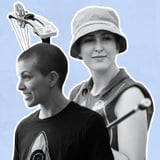The Paralympic Games are an incredible display of athletic performance and grit, a time when disabled athletes get to bring new eyes to their parasports. However, thanks to classification systems that many athletes claim are exclusionary or impractical, there are whole swaths of who cannot qualify to compete on an international stage. These disabled athletes have essentially been deemed not disabled enough to participate in the Paralympics.
In a , Sam de Leve, a swimmer with , describes it as being "left in a limbo where I am too disabled to compete against able swimmers and prohibited from competing against my peers." For the athletes who fall into that category, it can be a devastating outcome. Danielle Brown, a two-time Paralympic gold medalist in archery from the United Kingdom described the experience of being shut out of the international level of competition thanks to changing classification criteria after the 2012 Paralympics in London as spurring an "identity crisis.

" "You're an athlete and then, overnight, you're not," she tells PS. "But then you're also a disabled person who's not disabled enough and that just really messed with my head. You start questioning yourself like, 'Am I actually making it up?'" Disability advocates and para-athletes believe that the International Paralympic Committee (IPC) needs to overhaul the way they classify certain kinds of athletes.
As it currently stands, there are many conditions that are automatically excluded from qualification .























